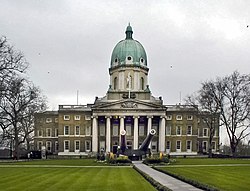This article needs additional citations for verification .(May 2025) |
 View along Lambeth Road | |
 | |
| Part of | A3203 |
|---|---|
| Namesake | Lambeth |
| Type | Road |
| Location | Lambeth/Southwark, London, England |
| Postal code | SE1 |
| Coordinates | 51°29′44″N0°06′54″W / 51.4956°N 0.11513°W |
| West end | Lambeth Bridge |
| Major junctions | Lambeth Walk |
| East end | St George's Circus |
| North | Hercules Road |
| East | Borough Road |
| South | Kennington Road |
| West | Albert Embankment |
Lambeth Road is a road in Lambeth (to the west) and Southwark (to the east), London running between Lambeth Bridge over the River Thames at the western end and St George's Circus at the eastern end. [1] [2] The road is designated the A3203. The borough boundary runs along it from the intersection with King Edward's Walk to Kennington Road.
Contents



Lambeth Palace, the London base of the Archbishop of Canterbury and the Museum of Garden History are to the north, towards the west by the river. St George's Cathedral Southwark is on the north side. Opposite on the south side is the Imperial War Museum, originally the site of the notorious Dog and Duck tavern and later the Bethlem Royal Hospital, the world's oldest psychiatric hospital.
Lambeth Walk adjoins to the south in the middle. Other adjoining roads include the Albert Embankment and Lambeth Palace Road by the river, Kennington Road and St George's Road. Some buildings on Lambeth Road are listed. [3]
The remains of Saint John Jones were displayed on what is now Lambeth Road after his execution in 1598.[ citation needed ]
The Archbishop Temple's Lambeth Boys' School was erected in 1902–4 on a site given by Archbishop Frederick Temple. [1]